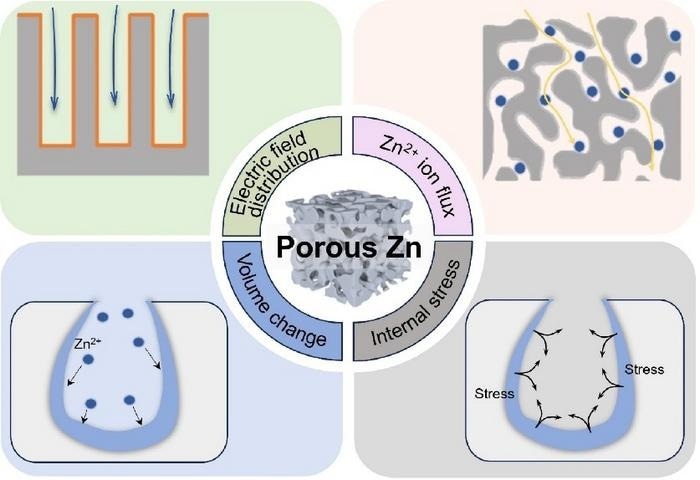Reviewed by Danielle Ellis, B.Sc.Sep 16 2024
Researchers from Tsinghua University and the University of Technology Sydney conducted a study published in Energy Materials and Devices. The study provides an in-depth analysis of recent advancements in the design of porous zinc metal anodes for aqueous zinc-ion batteries (AZIBs). The study focuses on the structural organization of these porous anodes to enhance battery performance. The review highlights how porous zinc anodes can address the limitations of traditional planar zinc anodes.
 This diagram illustrates the primary benefits of porous zinc anodes, including enhanced electric field distribution, improved Zn²⁺ ion flux, effective volume change accommodation, and internal stress relaxation, all of which contribute to the suppression of dendrite growth and increased battery performance in aqueous zinc-ion batteries. Image Credit: Yao Wang, Tsinghua University
This diagram illustrates the primary benefits of porous zinc anodes, including enhanced electric field distribution, improved Zn²⁺ ion flux, effective volume change accommodation, and internal stress relaxation, all of which contribute to the suppression of dendrite growth and increased battery performance in aqueous zinc-ion batteries. Image Credit: Yao Wang, Tsinghua University
The limits of present lithium-ion batteries, such as safety concerns and high costs, have prompted the development of alternative technologies as the global need for energy storage solutions develops. Aqueous zinc-ion batteries (AZIBs) are a potential option because of their affordability, environmental sustainability, and inherent safety.
However, obstacles like zinc dendrite formation still prevent their widespread use. Owing to these difficulties, further research into creative ways to enhance AZIB function is desperately needed.
The study demonstrates the major benefits of porous zinc anodes over conventional planar zinc anodes. The porous materials provide numerous nucleation sites, lowering nuclear energy barriers and minimizing localized charge accumulation. In turn, this inhibits dendritic formation, extending the battery's life.
Additionally, the work highlights the significance of three-dimensional porous structures in promoting homogeneous ion flux and uniform electric field distribution, both of which are necessary for stable zinc stripping and deposition. These anodes' large internal volume also allows for volume variations and deposition stress, which improves battery performance even further.
The review covers a range of technologies for fabricating porous zinc anodes, such as laser lithography, self-assembly, etching, electrochemical processes, and 3D printing. Additionally, the researchers offer tactical advice on how to create porous zinc anodes that will make it easier to use AZIBs in real-world grid-scale energy storage applications.
The development of porous zinc anodes represents a significant step forward in the advancement of zinc-ion batteries. By addressing the dendrite growth issue, we are moving closer to making AZIBs a commercially viable alternative to lithium-ion batteries. Our work not only provides a comprehensive understanding of the current advancements but also offers strategic insights into future research directions.
Dong Zhou, Study Lead Researcher and Professor, Tsinghua University
Energy storage could undergo a revolution thanks to the creative design of porous zinc anodes. These anodes may facilitate the creation of large-scale, sustainable energy storage systems, which are essential for integrating renewable energy sources into the grid by enhancing the functionality and safety of AZIBs.
Furthermore, improvements in porous zinc anodes may result in the development of safer and more affordable batteries for a variety of uses, such as electric cars and portable gadgets, supporting the global shift towards greener energy sources.
The study was funded by the National Natural Science Foundation of China, the China Postdoctoral Science Foundation, the National Key Research and Development Program of China, the Fundamental Research Project of Shenzhen, the Australian Research Council through the ARC Discovery Project, and the ACR Linkage Project.
Journal Reference:
Ding, Y., et al. (2024) Porous Zinc Metal Anodes for Aqueous Zinc-Ion Batteries: Advances and Prospectives. Energy Materials and Devices. doi.org/10.26599/emd.2024.9370040.